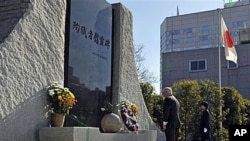U.S. Defense Secretary Robert Gates discussed realigning the U.S.-Japan "force posture" to respond to the threat from North Korea and potential threats from China, during talks Thursday with Japanese leaders.
After meeting with Japan’s prime minister and ministers of foreign affairs and defense, Secretary Gates said the talks focused on the need to work together more on a variety of issues, including developing an "appropriate" response to what he calls North Korean provocation and China’s growing military strength.
Gates stopped short of calling on Japan to do more militarily, which is limited by its post-World War II constitution. But he did call for a review of the two countries’ "force posture" and more practical cooperation.
"We have agreed that, as part of the deepening of our alliance, that we need to do more planning together and not just for the defense of Japan but for regional contingencies," he said. "We need the planning to be realistic and effective. And, we will pursue it with our counterparts in the ministry of defense."
At the same time, Gates softened U.S. rhetoric on the relocation of a U.S. base on Okinawa. The previous U.S. and Japanese governments agreed on a plan, but the new Japanese government has not moved to implement it because of political opposition on the island.
The United States had been demanding action but, on Thursday, Gates said Washington understands the sensitivities and will follow the Japanese government’s lead on the issue.
Secretary Gates’ talks here and earlier in the week in Beijing focused, in part, on North Korea. He expressed concern that South Korea’s people will press for retaliation, if there is another attack, and he says South Korea would have that right. But he has called on all the officials he has been meeting with to help avoid another attack.
"If there is a common theme in my visits, it is the common interests of the United States, Japan, the Republic of Korea and China for there to be stability and peace on the Korean Peninsula," he said.
Gates will travel to Seoul on Friday. He says the United States is committed to sustaining its military presence in northeast Asia, as well as increasing it in Southeast Asia, and "will firmly defend the principle of freedom of navigation" in spite of Chinese concerns about U.S. naval activity in waters in or near its 200 mile economic zone.




